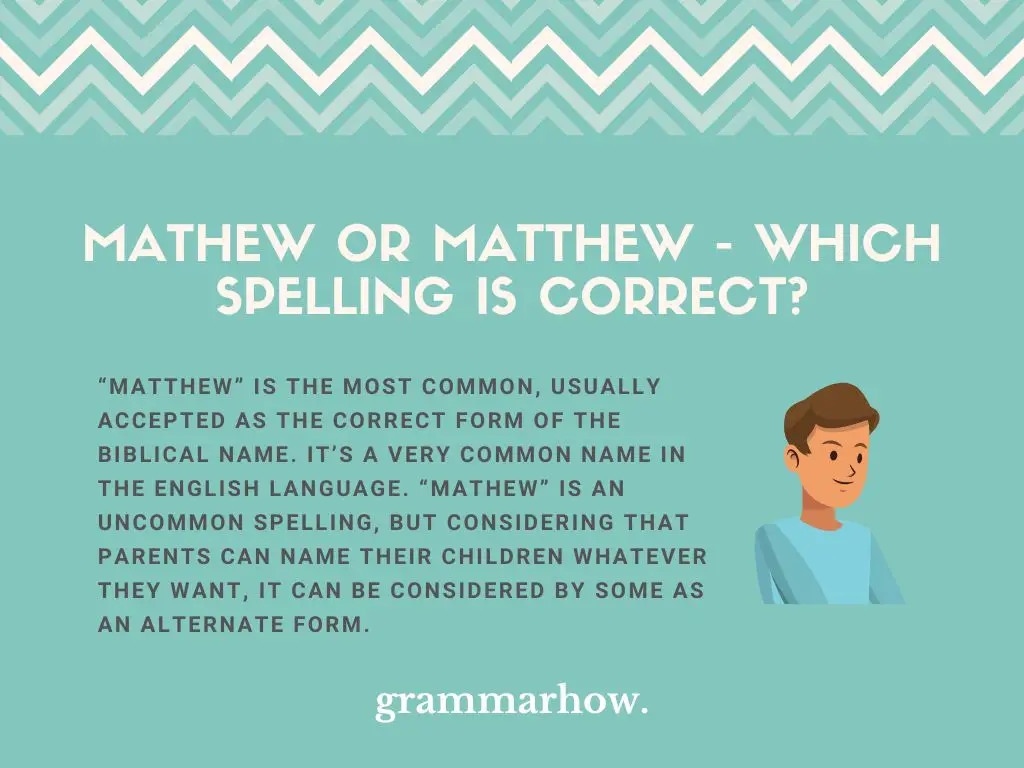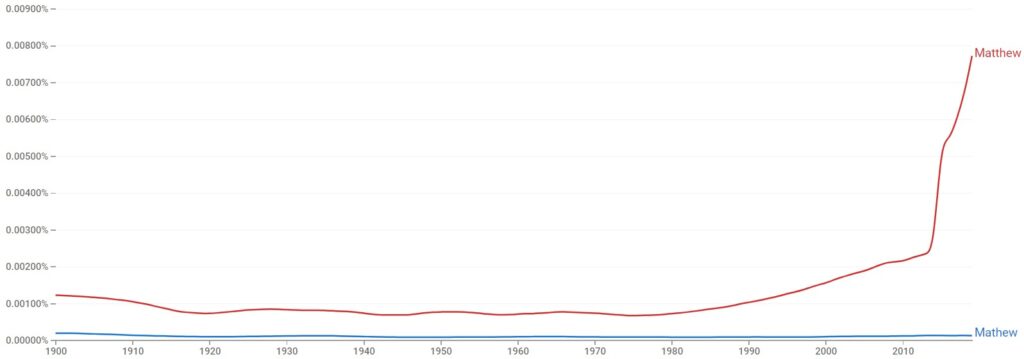Do you like the name “Matthew”? Or do you prefer to spell it as “Mathew”?
We want to know more about the name “Matthew”: what’s the correct spelling for it, if any form should be avoided, and what is the meaning of it. Let’s take some time and find out.
Mathew or Matthew – Which Spelling Is Correct?
“Matthew” is the most common, usually accepted as the correct form of the biblical name. It’s a very common name in the English language. “Mathew” is an uncommon spelling, but considering that parents can name their children whatever they want, it can be considered by some as an alternate form.

Let’s look at some examples:
- Mathew has been my friend for many years.
- Matthew has been my friend for many years.
Mathew
“Mathew” is an alternate spelling for the name commonly spelled as “Matthew”. Although some people may consider it a misspelling, we should keep in mind that parent can name their kids as they please, often making changes to known names.
Take a look at some examples:
- How long have you known Mathew?
- Mathew is so funny, I love his sense of humor.
- I met Mathew when we were only three years old.
- I heard Mathew has been working as a marine biologist!
- Are Sarah and Mathew dating?
Matthew
“Matthew” is a biblical name that means “gift of God”. It’s a very common name in the English language, very present in any age group. “Matthew”, with a double “t”, is usually considered the correct spelling for this word. You have likely seen this name a lot in movies, books, TV series, etc.
Let’s take a look at some examples:
- How long has Matthew been gone?
- Matthew just got a new car.
- I’m meeting Matthew for lunch today.
- Jack hasn’t seen Matthew in years.
- How old is Matthew now?
“Matthew” is the conventional form for this name. It’s the traditional, biblical spelling that people have been using to name their children for centuries. Unlike a trendy name that is hype right now, “Matthew” has been around for a long time.
That’s why some people may see it as weird that some parent may name their children “Mathew”, with only one “t” and spelling that is uncommon for this word.
However, we must remember that when it comes to names, it’s a parent’s prerogative to make choices. Maybe they want to honor a relative with that name. Maybe they have personal beliefs as to how they want the name spelled.
Whatever the case may be, it’s not anyone’s job to judge how a parent names their children, or make fun of someone because their name isn’t as common as we’d expect. Differently from a word that follows grammar and orthography rules, names should be respected as they are.
Which Is Used the Most?
Which one of those forms is used more often, “Mathew” or “Matthew”? Take a look at the graph from Google Ngram Viewer below.

The conventional spelling of the name “Matthew” is the one used by people more frequently. We expected to see that reflected on the graph, because “Matthew” is traditionally the correct spelling for this name. We correctly assumed it’d be the case.
“Mathew’, with its alternate form, appears closer to the bottom of the graph. Although it’s hard to affirm that a name is incorrect (especially because parents can choose how to name their children), we didn’t expect an unusual form to be prevalent when compared to the conventional form.
The graph also shows that “Matthew” has experienced considerable growth in usage since 2015. That indicates that this name is trending now.
Therefore, here’s our recommendation: if you plan on naming your child “Matthew” stick to the conventional form and avoid one that may be considered by some to be a misspelling. You certainly don’t want your child to be called out on issues with their name.
Final Thoughts
“Matthew” is the conventional, most accepted form of the biblical name that means “gift of God”. “Mathew” is an alternate spelling for the name – it’s unusual and uncommon, but how parents spell the names of their children is sort of a grey area in terms of right or wrong.
